#gmail server down
Explore tagged Tumblr posts
Note
Maybe I should wait for the PDF, but I’ve been thinking about password managers lately and might forget to check for that. My problem is that if there’s one thing I want to never ever put on the cloud to potentially get compromised, it’s my password information. But if there’s one thing I don’t want to lose access to, it’s also my password information. This seems to rule out both local options like KeePassXC and remote ones like Bitwarden.
I've started to become somewhat annoyed by the "there is no cloud, there is only someone else's computer" thing (this is a general thing, not specifically directed at you but you reminded me of it).
The risks of putting things on the cloud are that the internet or the provider will go down and you'll lose access to your data OR that the data will be compromised because the information is essentially public because it's on someone else's device.
Losing access because the provider crashes and burns or because there is a global internet outage is a distinct possibility, however with most password managers it is very very easy to download a copy of your data, which you can then store as an encrypted file on your desktop.
With companies like Bitwarden and Proton, which have open source encrypted cloud storage, your risk of compromise from being on someone else's computer is essentially zero. It IS important to make sure that you're finding a provider who is actually encrypting your shit and is not holding onto your password, which is why Bitwarden and Proton are the providers I keep recommending (privacyguides.org has recommendations here; bitwarden, protonpass, and keepassxc are all on the list, all of these are extremely safe options).
And that's where I have the problem with the "other people's computer" thing. I would have zero problems with storing a properly encrypted file in the comments of a facebook page. If a document had good encryption I would post it on livejournal and not worry about people getting into it. If you are working with good encryption, there is zero risk of compromise when keeping your shit on someone else's computer.
So I actually think the solution for either side of this conundrum is the same: If you're worried about losing access to your password manager because a service shuts down or the internet blows up, download a copy of your data to your desktop and store it in an encrypted folder on your computer. If you're worried about losing access to your password manager if your physical hardware is damaged in a disaster, export a copy of your data, save it as an encrypted file, and upload your encrypted file to gmail for all it matters - they will straight up not be able to get into it.
But that's also all kind of beside the point because a major feather in Bitwarden's cap is that you can self-host. It doesn't need to go on someone else's cloud, you can put it on your own server and never worry that someone else is going to tinker with your password manager.
Either way, you are sort of worrying beyond your means because if you're not using a password manager right now you are almost certainly at greater risk of credential stuffing attacks than anything else and need to put out that fire.
Anyway if you're at Harvey Mudd have you tried Dr. Grubbs across from where Rhino used to be? Everything on the menu is great but there is this jalapeño garlic sauce they've got to go with their mains that is so good that I want like two gallons of it.
326 notes
·
View notes
Text
ever wonder why spotify/discord/teams desktop apps kind of suck?
i don't do a lot of long form posts but. I realized that so many people aren't aware that a lot of the enshittification of using computers in the past decade or so has a lot to do with embedded webapps becoming so frequently used instead of creating native programs. and boy do i have some thoughts about this.
for those who are not blessed/cursed with computers knowledge Basically most (graphical) programs used to be native programs (ever since we started widely using a graphical interface instead of just a text-based terminal). these are apps that feel like when you open up the settings on your computer, and one of the factors that make windows and mac programs look different (bc they use a different design language!) this was the standard for a long long time - your emails were served to you in a special email application like thunderbird or outlook, your documents were processed in something like microsoft word (again. On your own computer!). same goes for calendars, calculators, spreadsheets, and a whole bunch more - crucially, your computer didn't depend on the internet to do basic things, but being connected to the web was very much an appreciated luxury!
that leads us to the eventual rise of webapps that we are all so painfully familiar with today - gmail dot com/outlook, google docs, google/microsoft calendar, and so on. as html/css/js technology grew beyond just displaying text images and such, it became clear that it could be a lot more convenient to just run programs on some server somewhere, and serve the front end on a web interface for anyone to use. this is really very convenient!!!! it Also means a huge concentration of power (notice how suddenly google is one company providing you the SERVICE) - you're renting instead of owning. which means google is your landlord - the services you use every day are first and foremost means of hitting the year over year profit quota. its a pretty sweet deal to have a free email account in exchange for ads! email accounts used to be paid (simply because the provider had to store your emails somewhere. which takes up storage space which is physical hard drives), but now the standard as of hotmail/yahoo/gmail is to just provide a free service and shove ads in as much as you need to.
webapps can do a lot of things, but they didn't immediately replace software like skype or code editors or music players - software that requires more heavy system interaction or snappy audio/visual responses. in 2013, the electron framework came out - a way of packaging up a bundle of html/css/js into a neat little crossplatform application that could be downloaded and run like any other native application. there were significant upsides to this - web developers could suddenly use their webapp skills to build desktop applications that ran on any computer as long as it could support chrome*! the first applications to be built on electron were the late code editor atom (rest in peace), but soon a whole lot of companies took note! some notable contemporary applications that use electron, or a similar webapp-embedded-in-a-little-chrome as a base are:
microsoft teams
notion
vscode
discord
spotify
anyone! who has paid even a little bit of attention to their computer - especially when using older/budget computers - know just how much having chrome open can slow down your computer (firefox as well to a lesser extent. because its just built better <3)
whenever you have one of these programs open on your computer, it's running in a one-tab chrome browser. there is a whole extra chrome open just to run your discord. if you have discord, spotify, and notion open all at once, along with chrome itself, that's four chromes. needless to say, this uses a LOT of resources to deliver applications that are often much less polished and less integrated with the rest of the operating system. it also means that if you have no internet connection, sometimes the apps straight up do not work, since much of them rely heavily on being connected to their servers, where the heavy lifting is done.
taking this idea to the very furthest is the concept of chromebooks - dinky little laptops that were created to only run a web browser and webapps - simply a vessel to access the google dot com mothership. they have gotten better at running offline android/linux applications, but often the $200 chromebooks that are bought in bulk have almost no processing power of their own - why would you even need it? you have everything you could possibly need in the warm embrace of google!
all in all the average person in the modern age, using computers in the mainstream way, owns very little of their means of computing.
i started this post as a rant about the electron/webapp framework because i think that it sucks and it displaces proper programs. and now ive swiveled into getting pissed off at software services which is in honestly the core issue. and i think things can be better!!!!!!!!!!! but to think about better computing culture one has to imagine living outside of capitalism.
i'm not the one to try to explain permacomputing specifically because there's already wonderful literature ^ but if anything here interested you, read this!!!!!!!!!! there is a beautiful world where computers live for decades and do less but do it well. and you just own it. come frolic with me Okay ? :]
*when i say chrome i technically mean chromium. but functionally it's same thing
462 notes
·
View notes
Text
Workout Challenge N°.1
"The best solo practice is exercise..." — Kat H., Sword Fitness Instructor
Welcome to the first Bauernwehr weekend workout challenge! Kat and Peter get a lot of requests regarding methods for individual solo-practice, and thus have dreamt up the Workout Challenge!
Initially designed to be a guide for weekends without classes, you can use these challenges to level-up your physical routine any day of the week!
WARM UP
Taiso
Jog in place, getting the knees as high as possible x 120 seconds
SET 1
Wall Sits x30 seconds
Bodyweight Squat x12
Rest 30 seconds
Repeat set two (2) more times.
SET 2
Bodyweight Forward Lunges x15 (for each leg!)
Plank x30 seconds
Rest 30 seconds
Repeat set two (2) more times.
SET 3
Pushup x 15
Bodyweight Backward Lunges x15 (for each leg!)
Rest 30 seconds
Repeat set two (2) more times.
SET 4
Full body crunch x15
Bodyweight Standing Calf Raise x 15
Rest 30 seconds
Repeat set two (2) more times.
COOL DOWN STRETCHES
We've created some instructional videos as well! If you need help with anything, don't hesitate to reach out to us on the Gotham Swords Discord server or directly via e-mail (bauernwehr@gmail)!
#fencing#hema#historical fencing#historical reenactment#swords#Sword Fitness#Fitness#fitness journey#exercise#messer#Langes Messer#HEMA#bauernwehr
16 notes
·
View notes
Text
Blap
I'm feeling blabby, and I doubt anyone here knows or cares at this point, but I erased my DA gallery today. 860+ drawings from over 18 years. It was my homepage for almost two decades, introduced me to friends, communities, the person I've married, and more, but the site is just so determined to be trash anymore. I already stopped uploading new stuff there a long while back, but now everything got pulled just because I don't want to be a part of anything feeding into what's there anymore. Feels a little bad to close down my biggest account anywhere (1550ish followers, still getting like 20 faves per day even after a long period of inactivity), but life goes on. ...If anyone here or anywhere else lost access to a commission, I still have those! Feel free to reach out to me here, on any other site, or via gmail (all with this same username) and I can help! ...otherwise, my galleries elsewhere are still getting uploads, and my free-to-join Discord Server still has all the newest stuff and variants. And a gallery thread! Anyway, RIP to a 20 year old DeviantArt gallery and the art journey it showed. And Positive Vibes! Life goes on, and more artwork is always coming.
8 notes
·
View notes
Text
✨ Dear contributors & backers: our final curtain call is here! 🎭

Thank you all for your patience as we wrapped up the last shipments from our leftover store (and then unfortunately dealt with a slight delay due to a technical issue with the donation site). We are *thrilled* to share the donation receipts with you!
Check the images in the spread to confirm the following amounts:
✈️ 850USD to Doctors Without Borders
💉���� 850USD to The Blood Center
Our hope is that it might encourage some smiles and pats on your backs because this was only possible thanks to all of you! Each contributor, each creative, each backer, each social media campaign, each share, each word of mouth *mattered* and it all led to this ~ thank you for bringing us to this moment, we are so deeply grateful for it 🥰
✨ To our contributors: be sure to check your accompanying email for a feedback form link and a timeline to save any important info from the server 💻
✨ To everyone: we’ll be closing down our platforms DM’s in one week to ensure we don’t miss anything during our hiatus, but our gmail account will still be available for anything urgent. Other than that, see you in the spring with our Volume Two interest check 😉
#interview with the vampire#iwtv#charity zine#the vampire chronicles#tvc#amc iwtv#iwtvzine#with gratitude#community love#crowd funded#fandom love
14 notes
·
View notes
Text
What types of issues does technical support handle?
Technical Support Services

Technical Supporting services serve a vital role and prospect, by keeping businesses and organizations running efficiently & active by resolving their IT-related problems and issues. From minor glitches to major disruptions errors, technical support teams and professional experts help to ensure that systems remain up and running while in use, allowing the users to stay productive and alert. But what exactly do they handle? Let's take a closer look at what to look for and they assist with.
Hardware and Device Issues:
Technical supporting teams and professional experts assist with problems related to desktops, laptops, printers, scanners, and other hardware. As this includes and consists of deliverables fixing hardware failures, replacing parts, configuring devices, and troubleshooting connectivity or performance issues. Whether it's a malfunctioning keyboard or a slow-loading workstation, Technical Support is there to help.
Software Installation and Troubleshooting:
From installing and implementing the applications to resolving and assisting the software errors and glitches, technical Support guides various software-related and applications concerns and points at a time. They help and assist with updating programs, fixing bugs, assuring the overall compatibility within the operating systems, and restoring the performance if an app crashes or freezes.
Network and Connectivity Problems:
A strong network and support is the backbone of modern businesses and companies. Technical Supporting officials handle and maintain the internet issues, router configuration, VPN access, slow connection speeds, and network outages. Whether it's a minor or impactful Wi-Fi issue or a more significant server connectivity problem, the support team works to restore communication quickly.
Email and Communication Tools:
Email downtime can affect the business continuity and its proceedings. The technical supporting team manages email configuration, syncing errors, spam filters, and login issues and errors across multiple devices and platforms, including Outlook and Gmail. They also handle collaboration tools like Teams, Slack, or Zoom when they don't function as expected.
Security & Access Management:
Working professionals play an essential role in managing the IT security measures and operating parameters. While they also assist to reset passwords settings, also help to manage the user accounts, set up two-factor authentication, and address down the ongoing suspicious activity.
Personalized Help and Guidance:
From onboarding and completing setup for the new users to answering tech-related questions, technical Support assures that employees use systems efficiently. Their goal is to minimize downtime and boost productivity. Companies like Suma Soft, IBM, Cyntexa, and Cignex offer dependable technical support services tailored to your specific business needs. Their expertise helps resolve issues faster and keeps your systems up and running at all times.
#it services#technology#saas#software#saas development company#saas technology#digital transformation
3 notes
·
View notes
Text
Alright....let's try this one last time.

;;{INSERT DISC 2 TO CONTINUE};;
[BUFFERING ■■■■□□□]
***Now Playing...》》》***
**Route 66 by Blue Jay Walker**
01:06 ━━━━⬤─────── 04:05
⇆ ឵឵ ឵឵ ឵឵ ឵឵ ឵឵ ឵឵◃ ❚❚ ▹ ឵឵ ឵឵ ឵឵ ឵឵ ↻
{⫘⫘⫘⫘⫘⫘⫘⫘⫘⫘}
🎡__**GENERAL INFO**__🎡
﹆ Name;; Kathryn ((Kitty)) Hawthorne
﹆ PenName;; Crooked Arcade
﹆ Age;; Mid twenties range, specifics unkown due to record tampering.
﹆ Gender;; Medically Intersex ((still looking for a label that fits))
﹆ Pronouns;; ((Any I suppose?)) He/She/They/It
﹆ Orientation;; Grey Ace
﹆ Species;; Biologically NonHuman //Bogeyperson//Dream Demon
{⫘⫘⫘⫘⫘⫘⫘⫘⫘⫘}
🎡__**BLOG INFO**__🎡
These are trying times we find ourselves in these past few years, the veil is thin, and those who reside within the uncanny valley are now slowly integrating back into the masses.
And I'm one of them.
Welcome to the Crooked Arcade, a blog archiving the daily life and joining in on the conversations of those non human users among us. The Arcade is a mixed bag, a melting pot of history and research posts, art, memes, and whatever else fits the vibe.
My DMs are always open, making connections with people like me is one of the reasons I keep going.
Sleep tight! Stay Weird! And don't let my Father bite.
{⫘⫘⫘⫘⫘⫘⫘⫘⫘⫘}
🎡__**SOCIAL**__🎡
//Tumblr;; You are Here!
|>;; Sideblogs
@Umbrella_Corp_Official (RE)
@Deceptive_Oasis (IHNMAIMS)
@TBA (YT Egos)
//Discord;; Homo_Necrosis
//Gmail;; [email protected]
{⫘⫘⫘⫘⫘⫘⫘⫘⫘⫘}
》{{Pssst- Down here!}}《
Hey Girl, Plagued by horrifying visions?
Do your childhood memories purely consist of events that would be labeled scientifically impossible? Do your parents defy the laws of physics on a daily basis?
Then maybe the Crooked Arcade Discord server is the right place for you!
A discord server catering to some of the most bizarre and overlooked among us. A safe space for the children of the night and those hailing from the uncanny valley to speak freely without the fear of being doxxed coming under the scrutiny or fakeclaiming that often happens in the open web.
;;{COMING SOON, LINK TO BE POSTED HERE};;









#alterhuman#alterhumanity#kin#otherkin#physically nonhuman#biologically nonhuman#kintype#cryptidkin#eldritchkin#monster otherkin#cryptid therian#terrorpunk#voidpunk#plural#sysblr#pluralgang#cripple punk#therian
19 notes
·
View notes
Text
What is Cloud Computing ?

Cloud computing has become a widely discussed topic in recent years, but explaining it in simple terms to someone without a background in computer science can be challenging. Allow me to break it down for you.
Cloud computing is a method of storing and accessing data and programs over the internet, rather than keeping them on your personal computer or mobile device. To illustrate this, let's consider online email services like Gmail or Outlook. When you use these services, you can access your emails from anywhere because they are stored in the cloud. This means you don't need to install any special software or save your messages on your hard drive. Instead, your emails are stored on remote servers owned by companies like Google or Microsoft. You can access them from any device connected to the internet, regardless of your location.
Understanding Servers in the Cloud
Now, let's delve into the concept of servers in the cloud.
The data stored in the cloud is saved on physical servers, which are powerful computers capable of storing and processing vast amounts of information. These servers are typically housed in data centers, which are specialized facilities that accommodate thousands of servers and other equipment. Data centers require significant power, cooling, security, and connectivity to operate efficiently and reliably.

Microsoft and Google are two of the largest cloud providers globally, and they have data centers located in various regions and continents. Here are some examples of where their data centers are located, according to search results:
Microsoft has data centers in North America, South America, Europe, Asia, Africa, and Australia.
Google has data centers in North America, South America, Europe, and Asia.
#codeblr#code#javascript#java development company#studyblr#progblr#programming#comp sci#web design#web developers#web development#website design#webdev#website#tech#html css#learn to code#cloud computing#datascience#dataanalytics
50 notes
·
View notes
Text
A list of why I am super duper lucky to be his girlfriend ♡:
(Much better if u listen to this song while reading !!)
1. He’s a date-to-marry type of guy, never messes around and is 100% committed. He never ever wanted to break up with me. Always chases me back whenever we get into serious fights and arguments and doesn’t let me go even if i’m being stubborn (There are times that I block him but he still manages to call me on all socmeds, even on gmail TvT this man istg)

2. He is very consistent. Writing this on the year we reached 4th year of our relationship and I can definitely attest that he’s very consistent with his efforts and unwavering love for me. He talks all caps and in tone that he’s always excited and happy to talk to me. He always asks me what I want to watch, play, and do with our time. He always wants me to pick because he’s happy when i’m happy. He religiously loves saying “Happy Wife Happy Life” HAHSHHAHA

3. He’s not afraid to learn and take accountability for his mistakes. He’s not perfect especially during the first and second year of our relationship. We definitely went through a lot of bumpy roads and because of it, we learned alot along the way. He always makes sure that his words and actions match. He wants to prove me countless of times that he’d never want to hurt me again and wouldn’t make me feel worthless. He’d always talk to me calmly even when at some point i’d get furious and my anger issues spill out, he’d still manage to calm me down and make me feel loved. He never even cursed at me let alone shout at me.

4. I believe he’s my ‘red string theory’. Our relationship started in Sep. 20, 2020. But we met a month before that in a game called Roblox, specifically Survivor(the game’s gone bc it got banned as it was against violation and was also copyrighted) We were 13 and 14 that time and it was the hit of the pandemic. We were both struggling with a lot of mental health problems so we were each other’s comfort and only support. A year later, we had our first date with a couple of our friends and then it multiplied from then on. Tbh the second date was also memorable as it was with his family na hehe. Imagine just because of two people, being awake at the same time, playing this game, on the same server, and suddenly they talk to each other(the fact that I never talked to anyone on the game and so did he, but we talked to each other?!?!?) and then boom, a healthy rs going strong for four years and counting. Now tell me that’s not destiny >:[

5. His WHOLE family loves me!! He comes from a very religious family while I grew up being an atheist, so right off the bat I had this strong feeling that I may probably be hated alot by them. But I was so wrong. They were very nice to me, very welcoming whenever i’m at their house. They even bring me to family gatherings (let me just add that he has a big family so when I say fam gathering, it’s really huge) and I’ve met almost everyone and they even brought me to his mother’s hometown!!! Aaaaa I also bought him to my mother’s hometown aswell mehehehebdjsnd His only sibling which is his little sister is also sweet and nice to me, and most of his closest girl cousins always hearts my stories !! so we’re like really supported in both sides

6. Nothing’s impossible for him when it comes to me. He becomes very selfless whenever it’s about me. There were weeks where I struggled financially because I can’t freaking budget my monthly allowance ($85) so whenever it’s the last week of the month, whenever I stretch out my leftover money and limit myself to no eating, he’d literally contribute to my wallet and wouldn’t take a NO from me. He’d limit himself from eating and would walk from his campus to the other side of the road to get home(which is very far btw) just so he could save up a lot and give me 66% of his allowance per day TvT Honestly even if I try to decline it he’d be so persistent. Which is why I make sure to give it twice back whenever I have the chance to. Might I add, his allowance compared to mine is so low and we’re both students but he’d really do all of this just to prove that nothing’s impossible for him and that he’d do anything for me hejsndk Also, other than money. He’d save up as well if he can and commute to my house which is (2-3 hours depending if there’s high traffic) and that would be doubled once he goes home. He’s so resilient with commuting that he got used to it and would always say “Kapitbahay ko lang ‘yang Parañaque eh” also there were nights aswell that we’d stay up and i’d tell him i’m too afraid to sleep because I might not wake up from my alarms, so he’d stay up and wake me up through calls or sometimes he’d choose to sleep and then alarms himself earlier than mine to wake me up huhu

7. He’d choose me out of anyone else in this world. His family would obviously be excluded here. But we’ve encountered many problems regarding our social circles and both sides have had this huge damage in our relationship. To his side, he really proved it well that he’d choose me over his 3(?) years trio friendship while I did the same with mine as well. We just opened each other’s eyes of how mentally exhausting and shitty those people were to our lives and that we both didn’t deserve that. But ofcourse, we forgive them and we never held grudges. We sometimes include them in our prayers that they’d have a good life ahead of them ^^

8. He always says I am his first girlfriend, first love, true love, greatest love, and last. Even though I know he’s had a relationship before me, he doesn’t count it because from his own words: “Peer pressured lang naman ako noon at hindi ko naman talaga siya gusto. Hindi ako yung lumapit, inenjoy ko lang atensyon niya.” Tbh if I was her(ex niya) and I hear him say that it’s prob gonna hurt real bad ahhshahshs but tbh, I never had a problem with his past rs he just probably thinks I do? HAHAHSHS so he always consider me as his FIRST girlfriend heheheh so I guess it’s a win anyway. Also, if anyone asks him what’s his type, his answer literally matches me. So i’m vv flattered hehe

9. He’s very loyal. His social media accounts are full of my face, from his posts to highlights to profile pictures to username—it’s all me!! He never ever hearts or reacts to any girl’s photos. His instagram is full of cat feeds or anything adhd meme related, his tiktok fyp is clear and even if you scroll hundreds of times there wont be any sign of girls, his tiktok reposts are also wholesome vids most of the time, his fb too is clear. He never adds or follow any girls, if a girl sends a request to him he doesn’t even respond and most of the time he deletes it HAHSHHAHA He also talks cold to most girls especially when it’s about school. He updates often if he’s out, sends pictures and videos and only hangs out with his boys. He doesn’t even play on his own TvT he only plays with me. He’d literally wait for the whole day until I wake up just to play. He also gave me his account right when we just hit three months of our relationship. So now I have like all access to everything and he doesn’t even mind. He doesn’t even have a girl bestfriend TvT He used to but damn he regrets it alot HAHHAHAHAHAH he always says that i’m the only gbf he needs and that’s so true so proud of him for saying that

10. He respects me alot and lets me wear whatever I want. He just always says he can fight. Plus he supports me with anything I wear. Hehe I even told him I might probably not want any kids in the future and he’s okay with it hejsndksnd he loves me and that’s all that matters. He also respects my choices, values, my body, and my time.

That’s all for now ^^ tbh there are many more to the list but I am very sleepy na HAHHSHAHD will post another one in the future :>
—emweii 12/02/2024. ♡
2 notes
·
View notes
Text
observations on the future of social media in regards to P2P and Blockchains and decentralized protocols in general ie nostr/iris, bluesky etc, what it means in Threads, Tumblr and Twitter/X's case and what it means to us as users
prefacing this with I'm just a person with access to google and a hefty amount of curiosity and a layman's understanding of the subjects so I will most likely be wrong about a couple things but I just wanted to write this to get a discussion going in a public space about what these social medias mean for the future of the internet and what I think their goals are and also to just get my thoughts in order
P2P in the simplest of terms is how torrenting works, it is peer 2 peer sharing of information ie computer 2 computer, so for example if you download something sent to you by a person from google drive its person > google servers > you, however if you torrent somethings its person > you (well in actuality its Multiple people> you and that's what seeding is but I am keeping it simple for my own sake) So in my quest to find a way to p2p stream things directly from a computer to another computer not on the same network on github, I've found that a huge amount of research has been done in general on P2P implementation beyond just media sharing in the last couple of years
and subsequently I fell down a rabbit hole of P2P social media, so what that means is imagine a social media without a middle man or a direct company. Twitter right now works as such, person tweets > passes through twitter servers > you access their tweet as shown to you through the twitter servers this mode of information sharing requires physical servers to store this data on, most companies don't own their own servers but instead rent them, usually from amazon or google, and twitter is the same, in fact almost everything on the internet is hosted through amazon servers and they have intense monopoly worldwide (x) (x)
this is partially how countries can exert their laws on these social media companies
P2P makes all of this obsolete, reduces the overhead cost of servers and takes them out of the equation, the sharing of information will be pingponged through multiple computers instead of passed through one large middle man that can be prosecuted and contacted for hosting/platforming this data. personally I am very excited about the development of P2P technology however, this form of decentralized social media isn't new people have been experimenting with it since 2012 and the early internet ran on p2p (IRC), but the biggest difference now is that people have combined it with blockchains (bitcoin) (W3C ie Web.3 consortium pretentious name I know) and this brings me to the current Big Fish battle that is happening right now between IRIS(NOSTR)/Blusky and Threads, Twitter
So starting with IRIS, most people have probably not heard of IRIS but what IRIS is, is a p2p social media running on a protocol called NOSTR, ELI5 protocols are just Ways of doing things/sharing information/guidelines, ie emails are just a protocol called SMTP (simple mail transfer protocol) that companies can build things around ex: gmail, runs on SMTP protocol I stumbled on the ex CEO of twitter Jack Dorsey on IRIS and a couple things struck me first scrolling through the site and his account. first even though Jack Dorsey is on the board of directors for bluesky and helped in its development he more so wants NOSTR protocol and IRIS to succeed and seems to be pushing them more heavily even on his twitter secondly the little dollar amount tied to every post he makes,

this literary banger is apparently worth a dollar and a half in "Zap Coins" this leads me to speculate on the future of bluesky because to me it seems like IRIS is being used as a testing ground for bluesky, bluesky currently DOESNT have bitcoin tied to its posts like nostr does but it does have the groundworks laid in in its protocol! I offhandedly mentioned previously that social medias are combining P2P and blockchain this time around and thats exactly what is happening in IRIS and what bluesky seems to be working towards, now what does this mean in IRIS's case? well from my understanding is that creating accounts on IRIS is exactly like creating a crypto wallet, in that your account will have its own unique generated hash encrypted number and every post you make is like making a transaction in the blockchain ie it has its own hash attached to it hence every post you make has a monetary value pros > makes you hard to find, posts are decentralized and spread over multiple computers worldwide and encrypted >can make as many accounts as you want no need for verification you just need to remember the unique hash attached to them >no servers hosting your information governments and companies have less control cons (to me anyways lol) >monetized posts >the power balance gets shifted from companies and goverments to ISP's and their abilities to connect you to other computers worldwide >nothing can ever actually be deleted its all recorded, you can orphan posts from your account I think? but they will still be findable
what does this mean in Blue sky's case?
Well starting with the differences, Bluesky is NOT p2p it is running on its own self made "decentralized" protocol called ATP (@ protocol) it is very theoretical and doesn't have any actual implementation anywhere as opposed to NOSTR and other protocols that twitter and tumblr run on I read through it and looked up some things but I genuinely don't understand how its supposed to be decentralized especially with how it seems to be implemented in actuality, so currently bluesky has frequent outages and is slow to use, if it were decentralized these things shouldn't be affecting everyone? so from my understanding it says that everyone has their own server PDS (personal direct server) that will host their posts and that it all PDS will be connected via a crawler which will siphon that information to an app, which I GUESS is decentralized but what does PDS mean in this case? signing up to bluesky is most definitely not hosting your own server with your own posts, you are putting these posts on a server somewhere, but who is it owned by? I read some articles saying that bluesky is starting out by hosting their own servers for you in that case they've just invented twitter 2 but with more flexibility in regards to third party implementation anyways rant aside, the similarities, while iris isnt the same as bluesky, bluesky's philosophy seems to be in a similar vain to iris and blue sky is following iris' steps closely, while iris isn't owned by one single entity, blue sky board of directors want to make some cash money and I assume thats why they didnt fully lean into p2p
like I mentioned before Blue Sky's protocol has the capabilities for bitcoin integration baked into it (x) I dont know if they will try to monetize the posts in the same way directly in bluesky as is done in IRIS but the ATP is very flexible and what that means is that they can create a different monetary based app that you don't even need to sign up for you'd just use your bluesky credentials and you'd have a crypto wallet tied to your blue sky account because your ID isn't tied to just blue sky, its tied to anything running the ATP protocol
sound familiar? this is what Elon musk is trying to do with Twitter rn and this is basically where he got the idea, he wants to make twitter the one stop shop app for everything, but this isn't a fantasy unattainable idea this is coming directly from the protocols IRIS and Bluesky use, and I will not be surprised if in the near future we see him attempt to integrate bitcoin into twitter
Twitter, Threads and Tumblr (triple T haha 3T if you will) are all going to try and compete with Bluesky and Iris because ~money~, but they are doing so with.... *drum rolls* Mastedon! the dark horse or more accurately the protocol that Mastedon uses which is called ActivityPUB, Activitypub is older than both NOSTR and ATP and has a history of a wide range of implementation, however if you've ever used Mastodon you'd know its very limited in its capabilities when it comes to social media
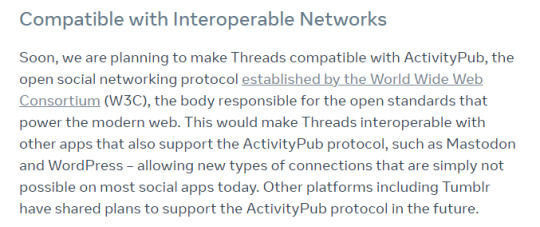
This is basically I theorize/speculate is one of the reasons tumblr changed its looks, they are trying to standardize social media between all 3 of them and basically build bridges between each other so as to combat IRIS and BlueSky This is not to say they will become like Mastedon however, in fact between Threads which has a huge amount of money to throw at inventing things and polishing the Activepub protocol and Automattic which owns tumblr and has owned wordpress for even longer who have a familiarity with blogging platforms and multi integration across multiple platforms I think they can be strong competitors
dont ask me what twitter is doing, I am not even certain it will integrate activitypub 100% I just think thats the easiest and fastest way to try and achieve elon's goals and threads and tumblr are combining
so what does it mean exactly when these sites say they will use ActivityPub?
it just means that they are trying to build bridges between each other, that is very vague and obscure of course because idk how they will go about it, the most basic way is post sharing between sites will change and become easier but its not limited to just that, IDK if they will even change the sites themselves instead of just building addons but tumblr's aesthetic change makes me think that they will
more importantly what does this mean for us Users?
well if you've read this far, I just want to emphasize that this isn't something to doom about, while I don't support crypto 100% I think the next wave of social media is headed in a good direction in that people are Finally focusing on decentralizations, social media that isn't under the thumb of one company or hosted on one single server (tumblr servers for example ALLEGEDLY were hosted on one amazon server without backup x) we are finally moving in a direction that is more open as I listed in the pros section above when it comes to IRIS I personally think those ones are worth the cons, however I want people to understand when they are joining bluesky, threads etc the conversation isn't about what these websites are good at NOW, you are NOT joining a twitter copy, all the social medias are gearing up to move away into a new era of internet, it may look the same but under the hood their goals are different, as far as I can tell every social media's goals are focused on 3 things currently >decentralization (lowering their costs in moderation, hosting etc) >getting money, alot of money as fast as possible (crypto integration, selling your data) >beating their competition and surviving as the big fish (protocols are duking it out iris/bluesky vs the world)
like I said at the start of this post I am just a layman with a keyboard, these are just observations I've made, and I could be wrong about multiple things here! but either way, curious about where we are headed
10 notes
·
View notes
Text
Ok it's becoming unavoidable.
The 2010s internet business model is failed, and it's very likely taking tumblr down with it. The good parts of this site are going to die.
There is an inherent disconnect between the best product/service and the most profitable product/service. However the assumption of correlation AND causation between these is at the core of capitalism.
I explain.
Booyah.
The business model which drives tumblr's decision making is the same as drove nearly all sites in the 2010s. There was so much reliable investor money, that sites could fully fund their costs and expand wildly without ever making a profit, or ever charging their users for a service. Their goal was the long game, offer something fun for free, get people hooked, become necessary for daily life; that if they could capture enough of a userbase, then that MUST be profitable at some point. How could a site with 50mil daily users not make money, right?
Well, there was enough money flowing in to prevent those questions from ever being seriously asked. Which is unfortunate, because the answer is no. YouTube, despite massive use, omnipresence, and so so many ads, doesn't make money. Gmail doesn't make money. They painted themselves into a corner by being free, and people are used to that. The status quo was always unsustainable. Employees cost money. Servers cost money. These bills were paid by willing investors in the past, but with little more userbase to conquer, what's bringing them in? Now websites are scrambling to maintain the cash flow necessary to stay alive, let alone improve.
Gmail, YouTube, Discord, Twitch all have mega profitable services bankrolling them for the sake of surveillance, but tumblr doesn't have that (neither do Reddit, Uber/Lyft, or Snapchat). Various buyers (Yahoo and others) have dumped cash on tumblr occasionally, but that's not going to keep happening. So what's the plan? Cutting costs will only guarantee a slow death and nonfunctioning website (Twitter). So tumblr must either increase revenue or fire everyone and shut down the site. I cannot stress enough that the status quo of a functioning website for free, cannot exist without someone dumping money on it.
Now finally I get to the main point 🎉
Have you ever spent hours mindlessly scrolling some app, bored the whole time, and at the end you feel like shit? According to our current system, this is your favorite app which you like using the most. Have you ever had a meaningful connection on a forum or witnessed perfect comedic timing in a reblog chain? Well unless you chose to spend hours experiencing these beautiful moments (oxymoron), then the system will interpret your enjoyment of those websites as far less. That is considered a bad website. The only metric currently used is eyeball time. This metric does not reflect user satisfaction.
This metric is used because it's a simple conversion from eyeballs to ad views to income. So eyeball time becomes the goal and social media sites become optimized towards quick-seratonin-hit addiction and features that trap rather than convincing user to choose to spend their time on a site. Why isn't the latter a good enough option? Because happy people don't choose to spend their days looking at ads.
And that's the heart of the issue. Humans are not happy when they're generating max profit. Capitalism is never satisfied with profit alone, it demands the greatest possible profit. And therefore capitalism demands systems which make us unhappy. This is tragically at the core of capitalism; the idea that consumer choice will direct companies to produce the best product. That the product which wins out must therefore be the best for consumers. But it's not true. It has never been true. It's why cigarette companies succeed while companies that make long-lasting cars fail.
Tumblr, with its features that encourage user interaction and discourage influencer culture, is more enjoyable and less profitable. Can they find a workforce of engineers who are just as talented and hard working as the Facebook engineers, but accept much lower salaries? Probably not. So what do they do? I expect they make things worse on purpose, and eek out some kind of survival. Remember the porn ban?
5 notes
·
View notes
Text
Site Outage
Just learning there has unfortunately been a fire at the facility that hosts the servers my website is hosted on in NYC (as of 19 hrs ago). My websites and email are unfortunately down during this time.
This affects the following sites/email:
LizLiu.com (as well as the associated sketchblog)
Liz at LizLiu.com email
Duskbirds.com
LizLiu.com/ggundam (the G Gundam fan translation site)
Fire marshal & everyone involved are working to restore power safely, but there might be a delay if you are waiting on an email response from me. And, if you visit my sites and they aren't loading, this is why. Hopefully it's restored soon!
If you need to get in contact during the power outage, I have a Landylachs at gmail backup email address you can use. I'll also use this address to respond to existing email chains during the outage.
There is no ETA as of right now, but my webhost has historically had excellent uptime. I expect it will be up as soon as possible!
Thanks to all involved who are working to restore power safely!
5 notes
·
View notes
Text
Setting up Gmail SMTP Server for WordPress Emails (Comprehensive Illustrated Guide)
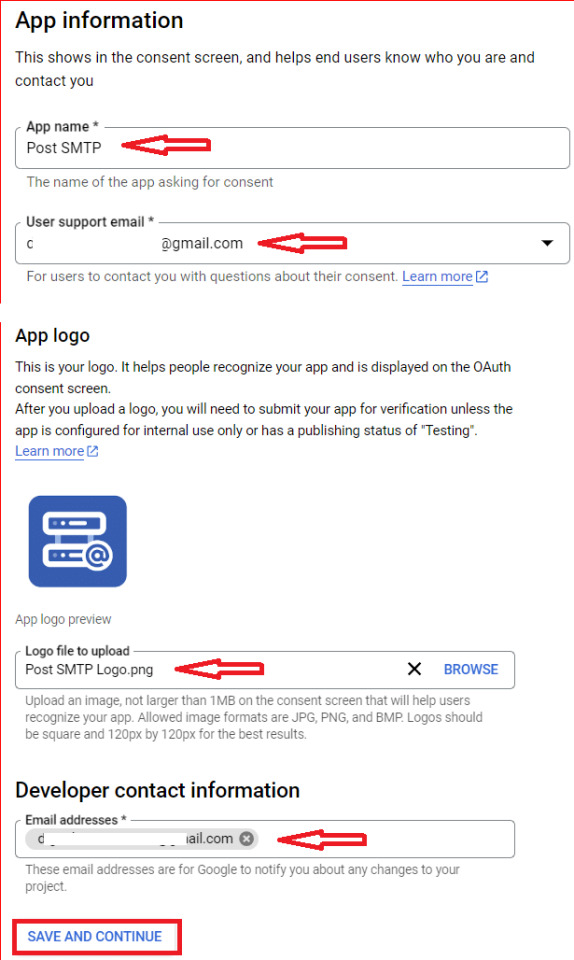
As a website owner, you undoubtedly realize that maintaining contact with existing customers is less expensive and more profitable—regardless of your field—than acquiring new ones. This is also true of your relationship with your website visitors. Therefore, you are required to ensure that your emails reach your subscribers or website visitors. This is a problem that has plagued many for years. Most servers (hosting servers) restrict the use of email, meaning that messages are either lost, classified as spam, or the transmission fails altogether. In today’s article, we will show you how to use the Gmail SMTP server to send your emails from your WordPress site and ensure their delivery. Instead of exposing your databases to the risk of leaks and submitting to the restrictions imposed by your hosting servers, we will rely on Gmail’s SMTP server to send emails, using an excellent plugin called WP Gmail SMTP. This offers several advantages. Advantages of using the WP Gmail SMTP plugin - Unlimited number of messages: Unlike hosting servers that impose a specific number of daily emails after which the service stops, using Google’s server means an unlimited number of daily emails. - Protection and security: When using WP Gmail SMTP, you don’t need to request a password from the subscriber, nor even display it. This plugin uses the OAuth 2.0 protocol to directly authorize the use of the Gmail account itself. It works—as we explained in previous lessons—as follows: - First, you create an application on the Google Developers platform. - The application requests the subscriber’s permission to access their email account. - Once permission is granted, the application obtains the account identifiers directly from their source. This means that this plugin guarantees the same security as the Gmail service itself. The plugin also provides double security through TLS/SSL message encryption. - WordPress compatibility: The plugin doesn’t use new sending methods that burden the site, but rather uses wp_mail, a built-in feature in WordPress for sending emails.
Preparing the WP Gmail SMTP plugin
We will divide the explanation into three parts for ease of follow-up and understanding. The first will be creating the application on the Google Developers platform. The second will be installing the plugin on your WordPress site. The third will be titled “Setting up the plugin.” The fourth will be where we will test the plugin. We will conclude with the fifth part, where we explain how to unlink your account from the application. 1- Create a Gmail SMTP application on Google Developers Go to the Google Developers website by clicking here. If you already have an account on this site, click (Create Project), or open your project if you have opened one before. Otherwise, the following window will appear to begin registering your account.
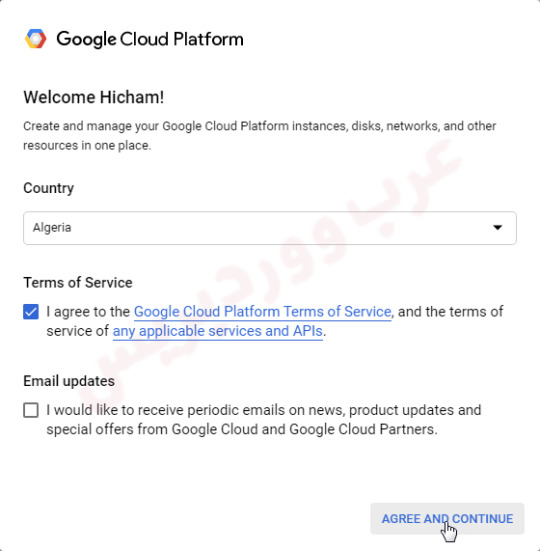
Click Agree and Continue You will then be logged into your account, then click Create New Project
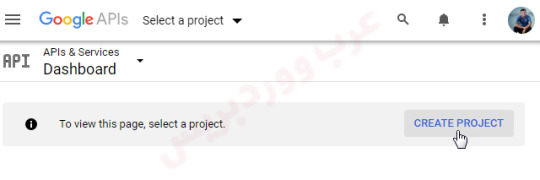
Give your project an appropriate name, and click Create to create it.
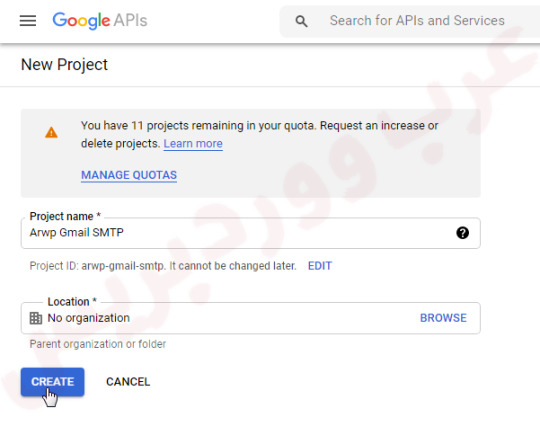
A notification will appear that the project has been created. To select it, click “Select Project.”

If the notification does not appear, you can click the arrow next to the drop-down list at the top left.
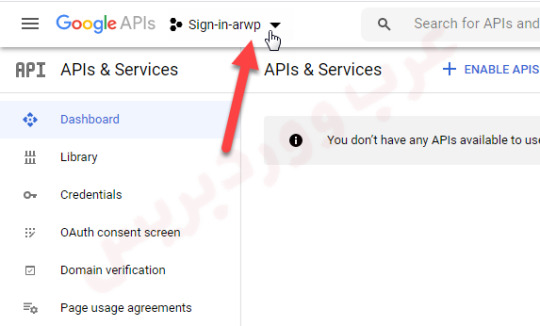
Then select your appropriate project.
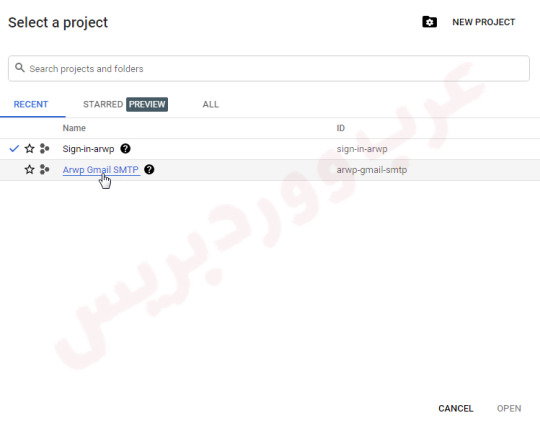
After ensuring that you have selected the correct project, click Enable APIS and services on the right side of the screen.
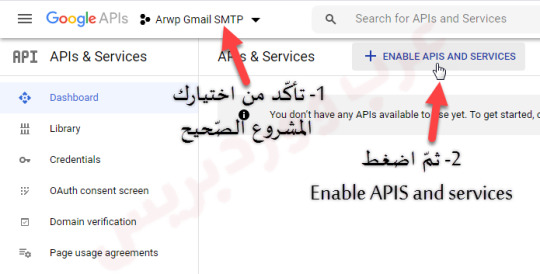
This will take you to the APIs page provided by Google. Go to the Google Workspace group and select Gmail API.
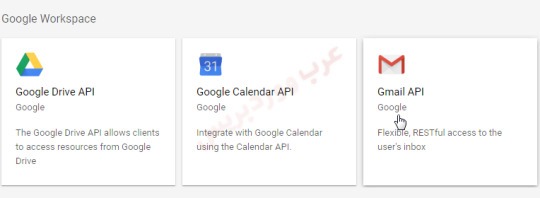
Click Gmail API and select Enable.
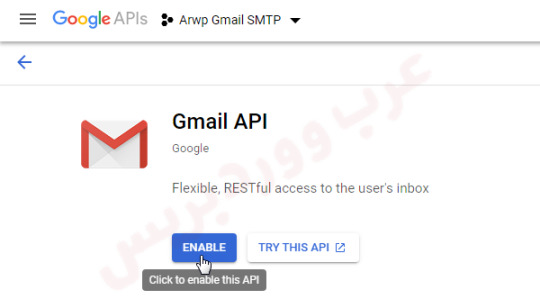
Now you have enabled the API, and now you need to create your own IDs. To do this, start by clicking Create Credentials.
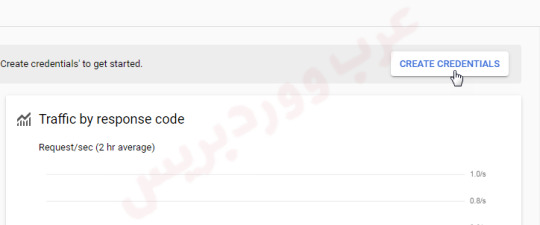
This will take you to a page to create your IDs. However, we can skip many of the steps by clicking directly on Client ID, which is what we need from this application.
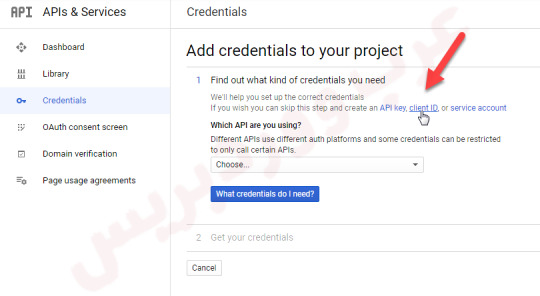
Now we’ve reached the OAuth protocol, and we need to set up the Consent screen. Click the appropriate option.
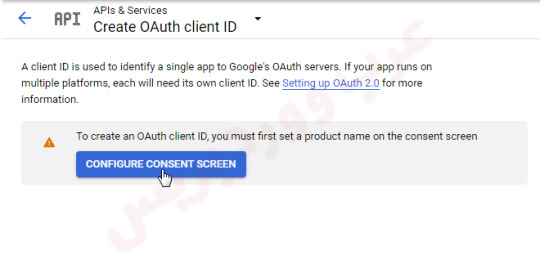
The page shown in the following image will appear.
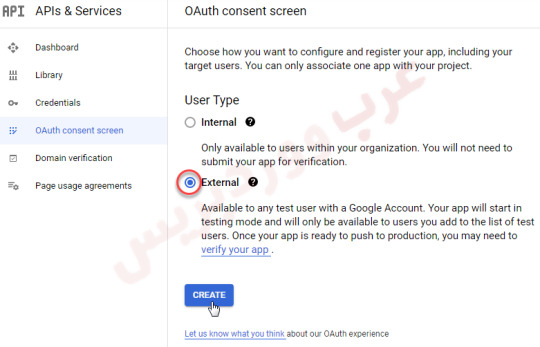
Since we’re not using G-Suite, we chose External. Then click Create. The application information page will appear. Fill it with the appropriate name for the application, a support email address, and a logo for the application, if desired.
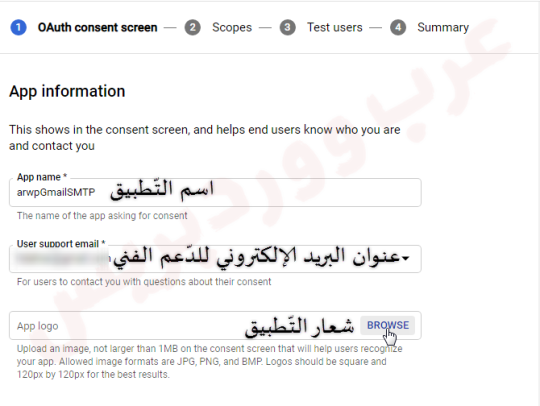
This information contains fields for optional page links, although we recommend creating them anyway.
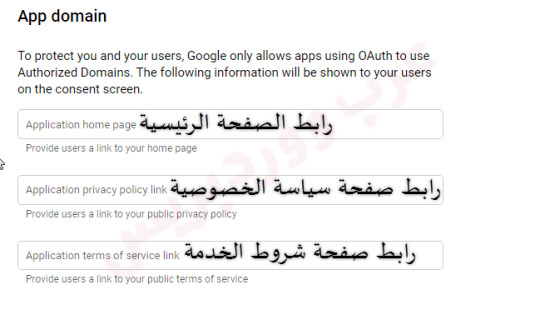
Finally, we arrive at the domain, or the link to the page on which the application will work. First, click Add Domain.
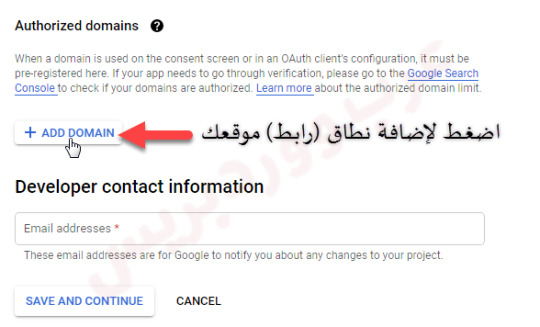
Then fill it with your website URL without https://, and fill in the contact information field with your email address that Google will use to notify you of any changes to your project. Then click Save and Continue.
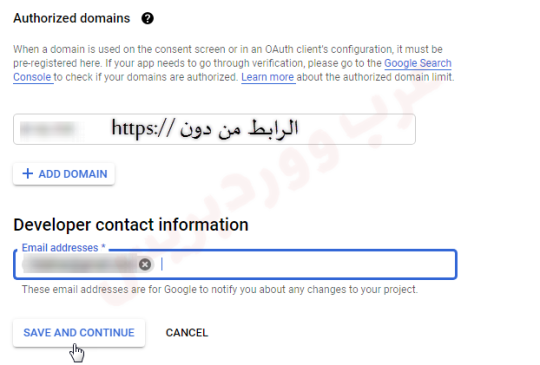
Now you’ve created the consent page application, you’ll need to create the IDs to enter them into the plugin on WordPress. Go to the left of the screen and select Credentials.
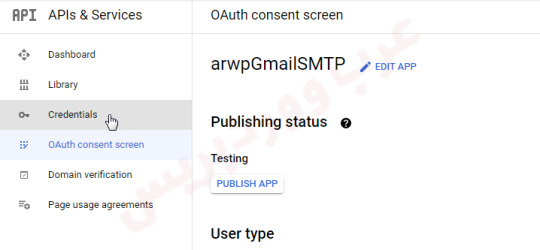
From the right, click Create Credentials
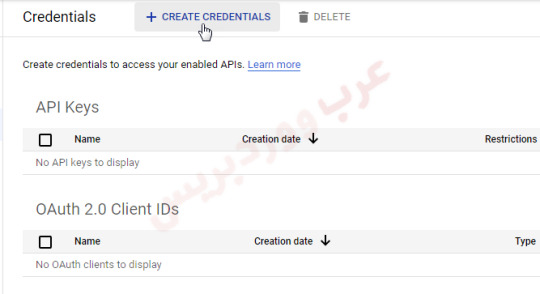
From its drop-down menu, choose OAuth Client ID
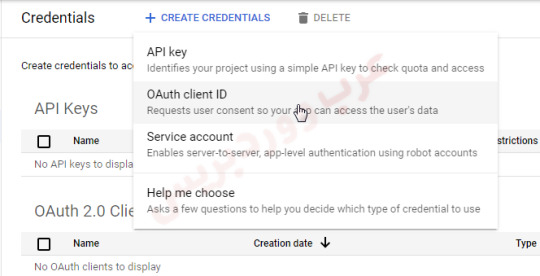
You’ll then reach a page asking about the application type. Since we’ll be using it on a WordPress site, choose Web Application.
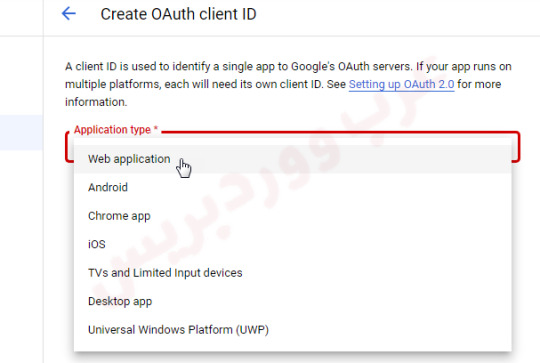
Name the application as appropriate, then click Add URL from the Authorized redirect url.
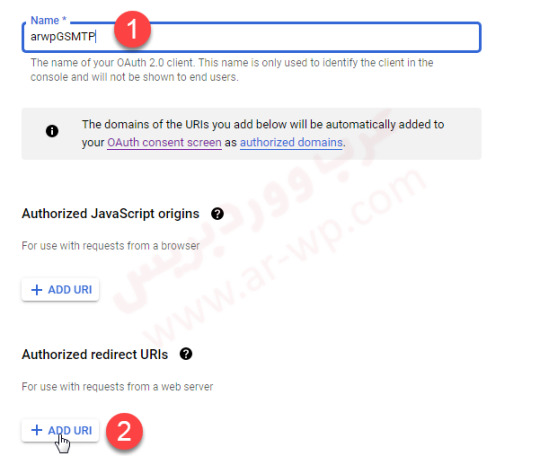
A box will appear, fill it with the following modified URL: https://example.com/wp-admin/options-general.php?page=gmail-smtp-settings&action=oauth_grant

- Then click Create. A window will appear with two lines representing Your Client ID and Your Secret. Copy them and save them in a safe place, as we will need them later to connect this application to WordPress.
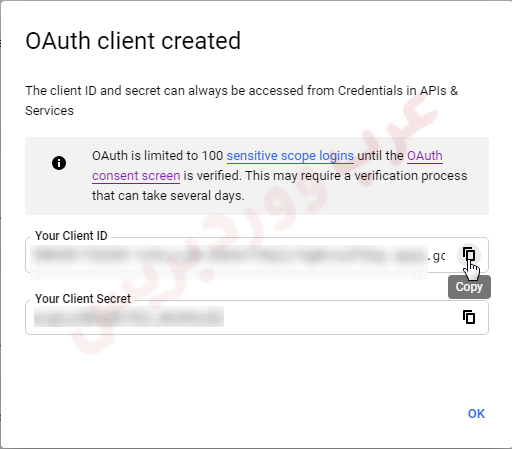
- This application is in beta, and we may encounter problems getting it to work, so we must publish it first. - Go back from the left to the OAuth Consent Screen page, and click Publish APP.
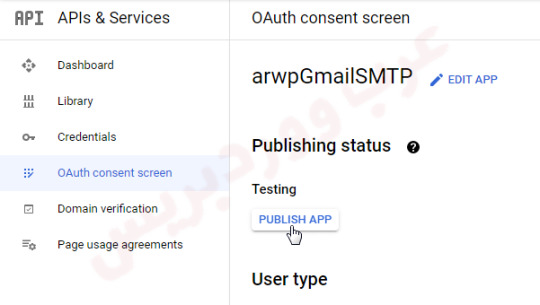
- Then click Confirm to confirm the publication.

With this, we have completed our work on the Google Developers Platform. Now we have reached the second part of our explanation. 2 – Install the WP Gmail SMTP plugin on WordPress In the WordPress dashboard, go to “Plugins → Add New” and type the plugin name in the search box: WP Gmail SMTPand wait for the results to appear. Then, click (Install Now) next to the plugin.
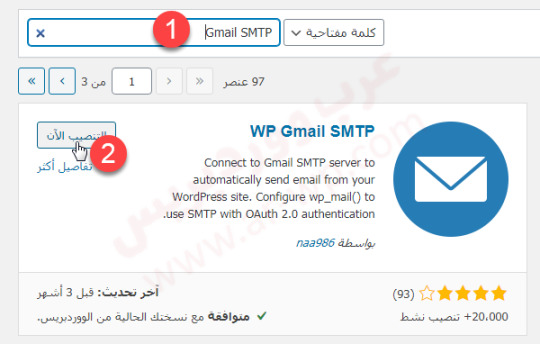
After the installation is complete, the activation option will appear, so click on it. When the phrase “Plugin activated” appears, we have completed the installation phase. 3 – Set up the WP Gmail SMTP plugin on WordPress Continue on the “Plugins” page, and begin as follows: Under the plugin WP Gmail SMTP click on the “Settings” option.
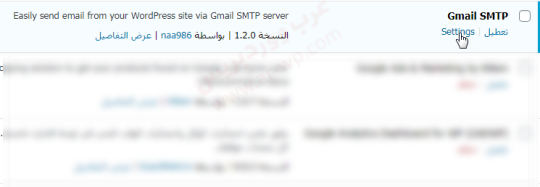
This will take you to the Settings page, where you will see that the application status is red (Not Connected), as we haven’t set it up yet. The Authorized Redirect URL box will also appear, which is the same link we used to create the Client ID and Client Secret. The two latter boxes will also appear, so copy them from where you saved them previously and paste each one into its appropriate box.
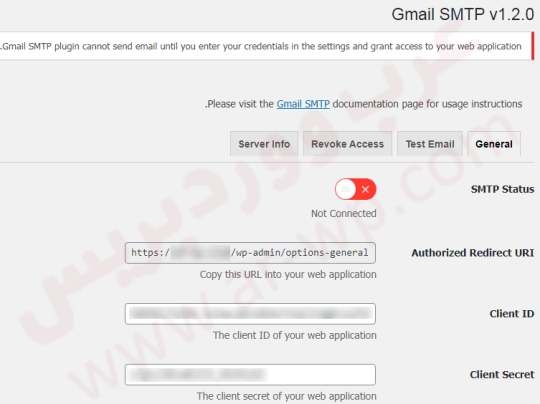
Continue filling in the rest of the options as shown in the following image, so that: - OAuth Email Address is the same email address you used in Google Developers. - From Email Address is the email address from which the messages will be sent. - From Name is clear from its name, and is the name of the sender. - Type of Encryption is the type of encryption. You can choose between TLS and SSL, but we recommend choosing TLS. - With your choice of TLS, fill in the port number with 587. - Finally, you can You can choose to disable encryption certificate verification to bypass the error message that appears when trying to use the application.

After filling in the options, click Save Changes, then click Grant Permission.

The approval application will appear, so choose your email to test the application.

- If you see the error Google Hasn’t Verified this app, click Advanced
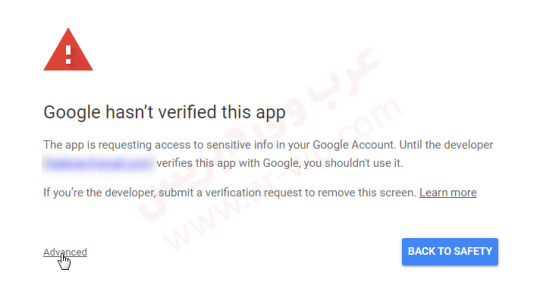
- then click Continue to
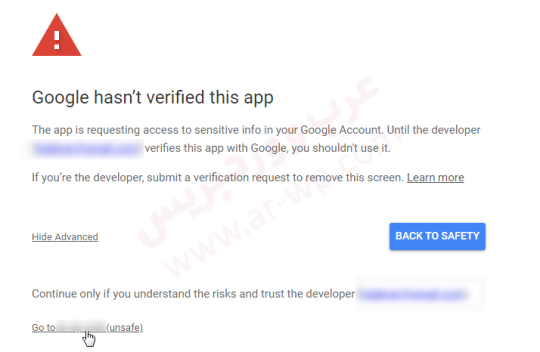
- Then grant permission for the app to access your email by clicking Allow
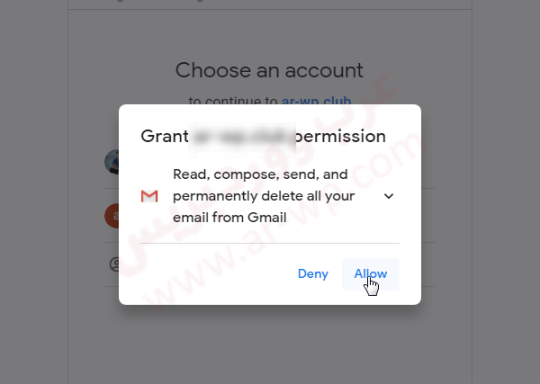
- then Allow again
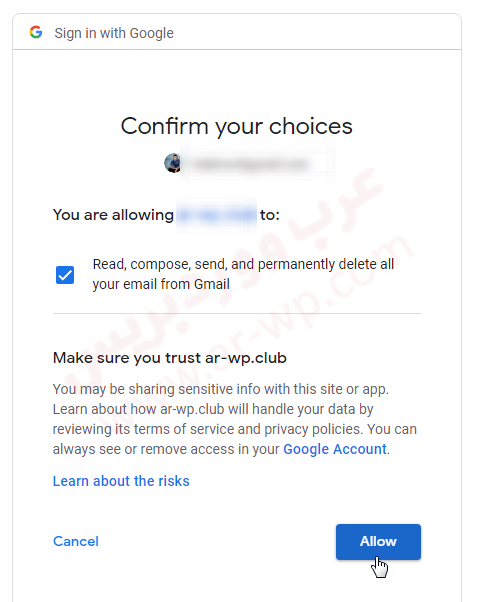
- If you see Access Granted Successfully and the SMTP status changes to Connected, this means that you have set up the app correctly.
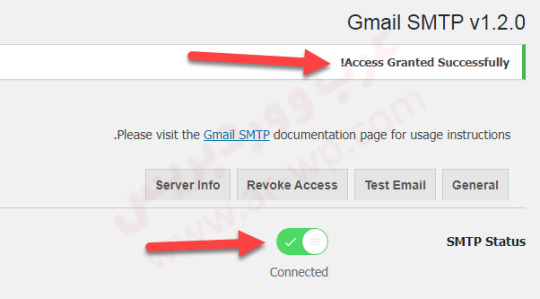
And so we reach the next step. 4- Testing WP Gmail SMTP on WordPress - You can finally test the app by clicking Test Email.
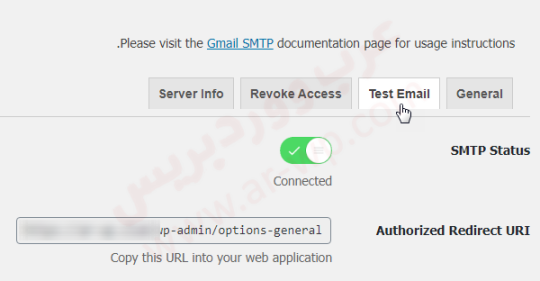
- Then fill in the fields as shown in the image:

- This is a real Gmail SMTP application test

- The message format inside the Gmail SMTP application
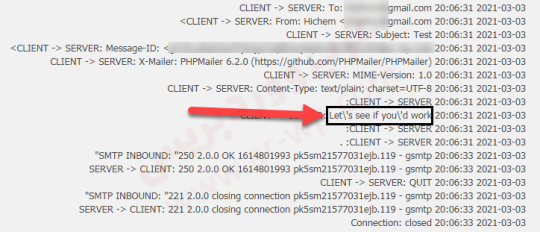
- The message format in the email
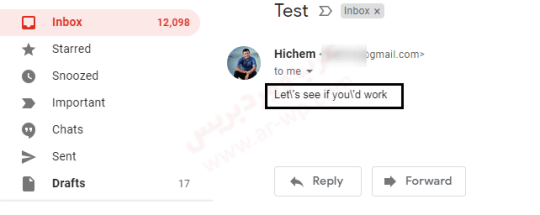
If you want – for one reason or another – you can revoke the permission you granted to the application and prevent it from accessing your email account. All you have to do is go to Revoke Access: - Revoke Access for the Gmail SMTP app
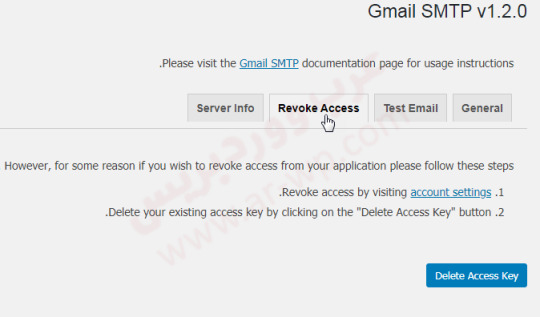
Start by removing the permission you granted the app to access your email. Click Account Settings to go to the account options in your email, where you will see all the apps that have permission to use it. - Remove Gmail API access from my Google account
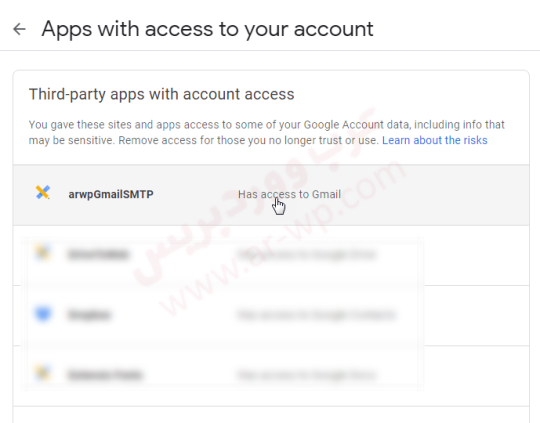
- Remove Access – Remove Gmail API access from my Google account Read the full article
0 notes
Text
🎓 How to Claim Google VEO3 Premium Student Plan for Free (No University Required)

The demand for cloud services and productivity tools is growing rapidly in 2025. If you’re someone who needs access to advanced Google features but can’t afford a subscription, there’s a 100% working method to get Google VEO3 Premium Student Plan for free — no student ID or tuition needed.
With the help of a VPN, a temporary student email, and basic internet tools, you can get 15 months of premium access, 1 TB Google Drive space, and more — completely free. Let’s break it down step by step.
✅ Why Choose Google VEO3 Premium?
Google VEO3 Premium is a complete productivity package for students and professionals. Here's what you get:
1 TB of cloud storage
Pro-level access to Docs, Meet, Sheets, and more
Tools optimized for collaboration and online learning
Extra security and faster performance
Free use for 15 months if verified as a student
But what if you’re not enrolled in a university? That’s where this guide comes in.
🧩 The 3 Tools You Need
To activate this method, you’ll need:
A Gmail account
A VPN (to change your online location)
A temporary .edu email
A VCC (Virtual Credit Card) or PayPal for verification
Don’t worry — you won’t be charged. These steps are just for identity validation.
🛠️ Step 1: Create or Use a Gmail Account
If you already have a Gmail account, you can use it. Otherwise:
Visit: Gmail Signup
Register a new account with a secure password
Confirm with your mobile number
A fresh Gmail helps keep everything clean and reduces errors.
🌍 Step 2: Set Up a VPN
The student premium offer is geo-restricted. You need to appear as if you are in the U.S., Canada, or U.K. for it to work.
➡️ Click here to get your VPN
Download the VPN from the link
Install it on your PC or phone
Connect to a U.S. or U.K. server
Keep it active throughout the whole process
This is the key to unlocking the student portal.
📧 Step 3: Get a Free .EDU Email
Visit a free .edu email generator or temp service:
🔗 TempUMail – Free .EDU Email Provider
Choose a .edu email from the list
Copy it
Stay on the website — you’ll need to access your inbox for verification
This will serve as your student email during registration.
💳 Step 4: Add Payment for Verification
Although it’s a free plan, Google still requires a payment method to verify identity.
You can use:
A Virtual Credit Card (VCC)
Or your PayPal account
No actual charges will happen. Just follow the instructions and verify.
🚀 Step 5: Activate Google VEO3 Premium
Now that you’re verified:
Log in using your Gmail
Enter the .edu email on the student plan page
Confirm the link sent to the .edu email
Add your payment method
Enjoy 15 months of full access!
🎯 Benefits You’ll Enjoy
Once your account is activated, you’ll unlock:
✔️ Google VEO3 Premium plan
✔️ 1TB secure cloud storage
✔️ Pro tools for work, study, and meetings
✔️ Seamless sync with mobile and PC
All for zero cost.
🛡️ Important Notes
Don’t disconnect the VPN until the setup is complete
If an email doesn’t work, generate a new .edu address
Use this method on your personal device to avoid issues
Don’t forget to bookmark this page: 👉 HERE
🎉 Conclusion: Smart Hack for Smart Users
This method has helped thousands of users in 2025 get access to a world-class productivity suite for free. It's safe, fast, and 100% working if you follow the instructions exactly.
💡 Want to get started? 👉 Grab your free VPN here Start enjoying the full power of Google — without paying a dime.
0 notes
Text
Alright, let’s break it down casually but thoroughly, just how you like it!
Here’s the real story behind this awesome graphic you posted:
⸻
How Email Protocols Work (and why you should care)
• Step 1: Sender hits “Send”
The email leaves your email client (like Gmail, Outlook, etc.) using SMTP (Simple Mail Transfer Protocol) over port 25 (or a secured version like SMTPS).
• Step 2: Sender’s Mail Server springs into action
The sender’s server does a DNS MX Lookup — meaning it looks for where to send the email.
(MX = Mail Exchange. It’s like asking, “Where do I deliver this package?”)
• Step 3: DNS answers back
DNS returns the IP address of the receiver’s mail server.
• Step 4: SMTP Transfers the Email
The sender’s server packages up your email, applies MIME encoding (if you’re sending files, emojis, or anything fancy), and sends it to the receiver’s mail server.
• Step 5: Mail Server queues it up
If the receiving server isn’t ready yet (busy, sleepy, whatever), the sender’s server will queue the email and retry.
• Step 6: Receiver’s Server gets it and stores it
Store and Forward style. No instant delivery! It’s received and stored until the user wants it.
• Step 7: Receiver downloads it
The receiver’s email client (Outlook, Gmail app, etc.) fetches the email using either:
• POP3 (Post Office Protocol v3): downloads it and usually deletes it from the server.
• IMAP (Internet Message Access Protocol): syncs emails between client and server (you can see the same emails on your phone, tablet, computer).
⸻
Key Email Protocols Explained:

0 notes
Text
Cloud Computing
Cloud computing refers to on-demand delivery of computing services such as servers, storage, databases, networking, software, and analytics over the internet ("the cloud"). Instead of maintaining physical data centers and servers, businesses can rent access to computing power and storage from a cloud service provider like Google Cloud Platform (GCP), Amazon Web Services (AWS), or Microsoft Azure.
This shift to cloud technology allows companies to scale resources as needed, reduce IT costs, and improve efficiency.
Types of Cloud Computing
There are three primary types of cloud computing services:
1. Infrastructure as a Service (IaaS)
IaaS provides virtualized computing resources over the internet. Businesses can rent servers, storage, and networking on a pay-as-you-go basis. Examples include Google Compute Engine and Amazon EC2.
2. Platform as a Service (PaaS)
PaaS offers a cloud-based environment where developers can build, test, and deploy applications without managing the underlying infrastructure. Examples include Google App Engine and Microsoft Azure App Services.
3. Software as a Service (SaaS)
SaaS delivers software applications over the internet, eliminating the need for installations. Popular SaaS applications include Google Workspace (Gmail, Drive, Docs) and Microsoft 365.
Why Cloud Computing?
1. Cost Efficiency
Cloud computing eliminates the need for expensive hardware and maintenance. Companies only pay for the resources they use, reducing IT costs significantly.
2. Scalability & Flexibility
Cloud services allow businesses to scale resources up or down based on demand, ensuring efficient use of computing power.
3. Security & Compliance
Leading cloud providers invest heavily in security measures, ensuring data protection and compliance with industry regulations.
4. Remote Accessibility
Employees can access cloud services from anywhere, making it easier to work remotely and collaborate in real-time.
5. Disaster Recovery & Backup
Cloud computing provides automated backups and disaster recovery solutions, ensuring data is protected even in the event of system failures.
Career Opportunities in Cloud Computing
As more companies adopt cloud technology, there is a growing demand for cloud computing professionals. Some of the top job roles include:
Cloud Engineer – Develops and maintains cloud infrastructure.
Cloud Architect – Designs cloud solutions and oversees deployment.
Cloud Security Specialist – Ensures cloud data security.
DevOps Engineer – Automates and optimizes cloud-based workflows.
Cloud Consultant – Advises companies on cloud adoption and implementation.
Learn Cloud Computing at Trendnologies, Chennai!
Are you ready to build a career in cloud computing? Trendnologies in Anna Nagar, Chennai, offers industry-focused Google Cloud Platform (GCP) training with 100% placement assistance.
Why Choose Trendnologies?
✔ Expert-Led Training – Learn from certified professionals with hands-on experience. ✔ Real-World Projects – Get practical exposure to cloud deployments. ✔ Certification Preparation – Pass Google Cloud exams with confidence. ✔ Job Placement Support – Resume building, interview coaching & job referrals. ✔ Flexible Learning Options – Weekday, weekend & online classes available.
📞 Call Now : +91 72001 24901 📍 Address : W122 Fourth Floor , WBLOCK, 3rd Avenue , Anna nagar, Chennai, Tamil Nadu 600040. E Mail : [email protected] Website : https://trendnologies.com/courses/google-cloud-platform-training-in-chennai/
#Google Cloud Platform training Kilpauk#GCP certification Kilpauk#Cloud computing course Kilpauk#GCP training with placement#Best GCP institute in Kilpauk#Google Cloud classes Chennai
0 notes